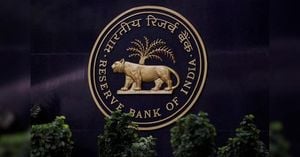Bengaluru's civic body, the Bruhat Bengaluru Mahanagara Palike (BBMP), has recently implemented a new property tax calculation method that is causing significant concern among homeowners. The changes, which affect both covered and stilt parking spaces, are expected to increase tax liabilities for many residents while potentially benefiting commercial establishments like shopping malls.
Under the revised Unit Area Value (UAV) system, residential properties will now be taxed at 20% of their parking space at a rate of ₹2 per square foot for 10 months. This amounts to ₹600 per month for a standard 150 square foot parking area. On the other hand, non-residential buildings will see a 25% tax applied to their parking spaces under the same rate. Previously, property owners were taxed based on a zonal classification system, which varied from A to F, and parking tax constituted about 50% of the overall property tax in many residential units.
The new uniform method aims to simplify the tax calculation process but has raised alarms among experts and residents alike. Anil Kalgi, Secretary of the Bangalore City Flat Owners’ Association (BCFOA), voiced strong opposition to the changes, calling the move “unconstitutional.” He pointed out that homeowners already pay taxes on shared areas—including parking—under the super built-up metric during property purchases. Now, they could end up facing double taxation for the same area.
Real estate analysts warn that this tax overhaul, combined with rising property prices, could further strain the budgets of homeowners. While commercial entities like malls may find the standardized approach advantageous, residents are being advised to reassess their tax filings and consider filing appeals if they believe their tax burdens are unjust. Moreover, experts urge the BBMP to address the issue of unauthorized roadside parking, which remains largely untaxed and unmanaged.
In addition to the changes in property tax, the BBMP has also introduced a Solid Waste Management (SWM) user fee, which began collecting from April 1, 2025. This fee will apply to all residential, commercial, institutional, and hospitality properties across the city, adding another layer of financial obligation for property owners.
The SWM user fee will be capped in certain cases to avoid disproportionate taxation. For rental-use properties, the fee will not exceed 30% of the annual property tax, while for mixed-use properties, it will be capped at 60%. However, reactions from residents have been mixed. Many accept the principle of paying for waste management, but others express concern about the amount and method of collection.
Ramya Narayan, a resident of JP Nagar, shared her frustration, stating, "We're already paying high property taxes and dealing with poor garbage collection in several areas. Adding another layer of charges, even if it's for a legitimate cause, is burdensome." Similarly, Mukesh Shetty, a commercial property owner in Rajajinagar, highlighted the lack of accountability in current waste disposal systems. He questioned, "What assurance do we have that BBMP will improve its services once it starts collecting this fee? Waste still piles up in our area and contractors remain unaccountable."
For larger commercial establishments, the new waste management fees can be staggering. For instance, a 10,000-square-foot warehouse will incur a monthly fee of ₹38,000. Sindhu Prakash, who manages operations for a logistics firm in Jalahalli, remarked, "The government must explain the rationale behind such a high fee, especially when no graded service levels are promised."
Despite the backlash, the BBMP maintains that the user fee is essential to support the city's mounting waste management costs and aligns with the ‘polluter pays' principle. The fee structure is set to escalate annually from 2026-27 onwards, as per state government guidelines. The Karnataka government granted approval for the user fee on March 4, 2025, with formal approval from the BBMP administrator on April 4, 2025, paving the way for city-wide implementation.
The introduction of the SWM user fee is expected to generate ₹750 crore annually for the BBMP, covering services such as the collection, transportation, processing, and disposal of garbage. However, the implementation of these fees has raised concerns about the financial burden on property owners, especially amidst the ongoing challenges with waste management services.
As the BBMP rolls out these new taxation methods, residents are urged to carefully review their property tax assessments and stay informed about potential appeals or rebates. With property tax being a significant recurring expense, many are now evaluating how the new rates will impact their annual tax obligations.
In summary, Bengaluru's new property tax and solid waste management fee systems mark a significant shift in the city's approach to taxation and waste management. While the BBMP aims to streamline the process and ensure fair contributions from property owners, the potential for increased financial strain on residents remains a pressing concern. As the city adapts to these changes, it will be crucial for the BBMP to address the apprehensions of its citizens and ensure that services improve in tandem with the new financial obligations.






